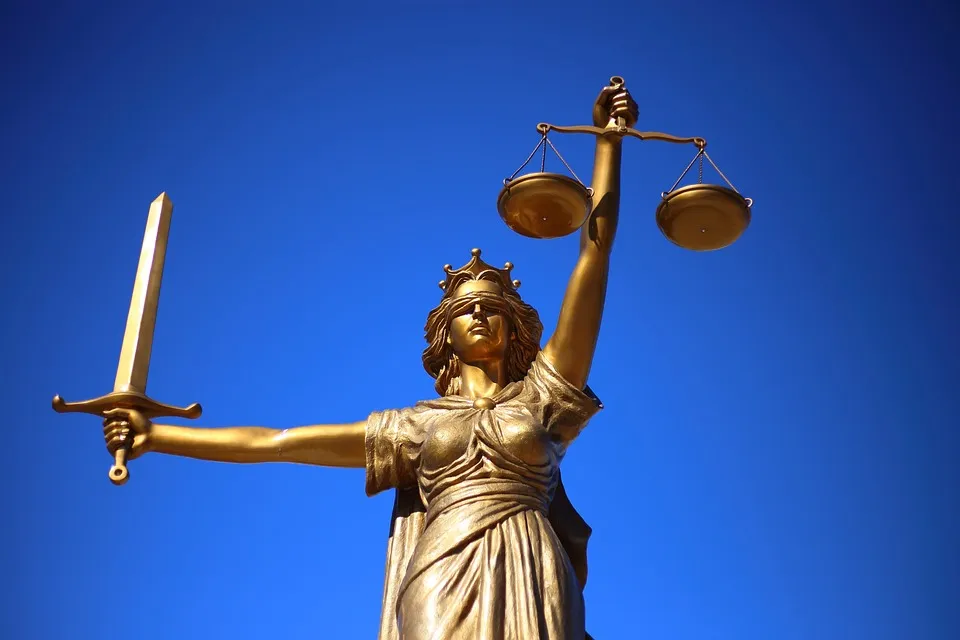Justicia, un tema del cual mucho se puede reflexionar desde distintos ángulos. Esta palabra inmediatamente nos hace pensar en leyes, tribunales, fuerzas policiales, etc., pero en el fondo, podría decirse que la justicia está presente en todos los ámbitos de la vida. En esta publicación trataremos de indagar un poco al respecto.
Este es el enlace de la iniciativa: Iniciativa: Cultura Humana Semana 3: Leyes. En la comunidad Humanitas.

Desde un punto de vista más cotidiano, la justicia es lo que se busca en la sociedad a través de leyes y ejecutores de las leyes que buscan resguardar la seguridad y vida de las personas. En la mayoría de los casos, son organismos públicos o el Estado quienes se encargan de proveer la justicia, aunque eso no impide que pueda existir justicia a través de organismos privados o sociedades autónomas (pero eso es otro tema).
El punto es que, tal como se menciona en la iniciativa con el caso de Solón en la antigua Grecia, la justicia se relaciona a algo comunitario y el objetivo de conseguir la paz común. El objetivo sería que cada quien reciba lo justo, pero ¿Cómo se logra? ¿Qué debe recibir cada quien y cuanto...?
La palabra justicia se relaciona también a la palabra juicio. La acción de juzgar, más allá de cualquier significado cotidiano, quiere decir "deliberar" o "emitir sentencia". Es decir, juzgar no es criticar, sino más bien darle un valor a algo, darle un significado o darle una imagen. Juzgar a una persona o situación no es muy diferente a lo que hace un juez en una corte.
Juzgar entonces implica darle a algo el valor que tú consideras correcto. Y esto implica fragmentar o separar, muchas veces este juicio puede entrar en conflicto con la opinión de otras personas, por lo que se suele delegar esta tarea en un tercero neutral o a personas que tengan mayor criterio ya que estudiaron para ello. La fragmentación o separación puede generar muchos conflictos, por lo que ya vemos que en el tema de la justicia es difícil llegar a un consenso común.
Incluso podemos encontrar en la Biblia referencias a la Justicia desde un punto de vista "conflictivo". En el Antiguo Testamento, se hace referencia al Satán como una especie de "juez", que no es necesariamente malo sino que trabaja para Dios ejecutando castigos a los seres humanos que han realizado malos actos. Isaac, hijo de Abraham, representa también, de alguna manera, a la justicia, y además se vuelve ciego ("la justicia es ciega").

Y entonces ¿Qué debe recibir cada quien y cuanto?
Si hablamos de lo justo para cada individuo de la sociedad, podríamos pensar en cosas materiales, Quizás se tenga la idea de que la justicia implica que todos tengan acceso a determinada cantidad de comida, a cierto grado mínimo de educación, sanidad, etc. Sin embargo, no hay manera de determinar exactamente qué cantidad de comida es la justa para todos, qué educación y en qué cantidad es la correcta para todos, etc. Caemos de nuevo en al problema de que muchos tendrán un juicio u opinión diferente, y que esa "cantidad justa" será definida o impuesta, probablemente por el Estado, es decir, un pequeño grupo de personas sobre el resto de la población.
Creo que la idea de justicia quizás deba ir más allá de lo material. Podríamos hablar de principios fundamentales, y a partir de ellos, cualquier persona tiene el derecho de obtener lo que necesite. Podríamos hablar del derecho a la vida, a la libertad y a la propiedad privada (este último quizás debatible desde distintas ideologías...). Entonces, la idea de la justicia sería proteger o garantizar estos derechos.
Lo anterior no implica que no se deba ayudar a los más necesitados, sino que sea a ellos a quienes se les ayude de manera adecuada para que puedan salir adelante. Quizás la mejor justicia sea que todos tengan la libertad de perseguir sus fines, sin violar los derechos de otros, y que en el proceso, todos tengan acceso a la cantidad de recursos que les hagan falta.
Pero la Justicia quizás no se trata solo de leyes o el ámbito de derechos, sino que en todo los aspectos de lo humano deberíamos ser justos. Si incurrimos a excesos, ya sea en comida chatarra, distracciones, o a cualquier cosa que nos haga daño, no estamos poniendo límites, es decir, no estamos juzgando correctamente. Y esto nos repercute en lo individual, y en segunda instancia, en los demás. Quizás hablaríamos de justicia en lo "personal".
Un buen ejemplo de sistema justo es la blockchain o cadena de bloques. En donde todos bajo consenso aprueban las acciones a realizar y de manera casi automática. Obviamente, los seres humanos son más complicados que las máquinas, y el consenso es muy difícil, pero la idea sería formar individuos con valores y principios justos, de manera que todos en conjunto "validen" mejor las acciones y sean capaces de organizarse en sociedades más pacíficas.
Quizás algo más que me quede por reflexionar acá es que debemos tratar de juzgar menos y entender más, entender al otro ser humano en lugar de darles nosotros una imagen desde nuestra mentalidad. De esta manera se genera más unión, comunicación, bases para que haya más paz y justicia.
Espero que hayas disfrutado de esta lectura. Deja tu comentario u opinión. Invito a participar en esta iniciativa a @valexaid @merp99 @greengalletti @rosahidalgo @slwzl @soyunasantacruz
English version
Justice, a subject on which much can be reflected from different angles. This word immediately makes us think of laws, courts, police forces, etc., but basically, it could be said that justice is present in all areas of life. In this publication we will try to investigate a little about it.
This is the link to the initiative: Initiative: Human Culture Week 3: Laws. In the [Humanitas] community(created/hive-186119).

From a more day-to-day point of view, justice is what is sought in society through laws and law enforcers that seek to protect the safety and lives of people. In most cases, it is public agencies or the State that are in charge of providing justice, although this does not exclude the possibility of justice through private agencies or autonomous societies (but that is another topic).
The point is that, as mentioned in the initiative with the case of Solon in ancient Greece, justice is related to something communal and the objective of achieving common peace. The objective would be that everyone receives what is just, but How is it achieved? What should everyone receive and how much...??
The word justice is also related to the word judgment. The action of judging, beyond any everyday meaning, means "to deliberate" or "to pass judgment". In other words, to judge is not to criticize, but rather to give a value to something, to give it a meaning or to give it an image. Judging a person or situation is not very different from what a judge does in a court of law.
Judging then implies giving something the value that you consider correct. And this implies fragmenting or separating, many times this judgment may conflict with the opinion of other people, so this task is usually delegated to a neutral third party or to people who have better judgment because they studied for it. Fragmentation or separation can generate many conflicts, so we can see that in the matter of justice it is difficult to reach a common consensus.
We can even find in the Bible references to Justice from a "conflicting" point of view. In the Old Testament, reference is made to Satan as a kind of "judge", who is not necessarily evil but works for God by executing punishments to human beings who have performed evil acts. Isaac, Abraham's son, also represents, in a way, justice, and he also becomes blind ("justice is blind").

And then What should everyone receive and how much??
If we talk about what is fair for each individual in society, we might think of material things. Perhaps we have the idea that justice implies that everyone has access to a certain amount of food, to a certain minimum degree of education, health, etc. However, there is no way to determine exactly what amount of food is the right amount for everyone, what education and in what quantity is the right amount for everyone, and so on. We fall back into the problem that many will have a different judgment or opinion, and that this "right amount" will be defined or imposed, probably by the state, i.e. a small group of people over the rest of the population.
I think that the idea of justice should perhaps go beyond the material. We could talk about fundamental principles, and from them, any person has the right to get what he or she needs. We could talk about the right to life, liberty and private property (the latter perhaps debatable from different ideologies...). Then, the idea of justice would be to protect or guarantee these rights.
This does not imply that the most needy should not be helped, but that they should be helped in an adequate way so that they can get ahead. Perhaps the best justice is that everyone has the freedom to pursue their ends, without violating the rights of others, and that in the process, everyone has access to the amount of resources they need.
But perhaps justice is not only about laws or the scope of rights, but in all aspects of human affairs we should be fair. If we incur to excesses, whether in junk food, distractions, or anything that hurts us, we are not setting limits, that is, we are not judging correctly. And this has repercussions on the individual, and in second instance, on others. Perhaps we would speak of "personal" justice.
A good example of a fair system is the blockchain. Where everyone under consensus approves the actions to be taken and almost automatically. Obviously, human beings are more complicated than machines, and consensus is very difficult, but the idea would be to form individuals with fair values and principles, so that all together better "validate" the actions and are able to organize themselves in more peaceful societies.
Perhaps something else that remains for me to reflect here is that we should try to judge less and understand more, understand the other human being instead of giving them an image from our mentality. In this way we generate more union, communication, bases for more peace and justice.
I hope you enjoyed this reading. Leave your comment or opinion. I invite @valexaid @merp99 @greengalletti @rosahidalgo @slwzl @soyunasantacruz to participate in this initiative.
Translated to English language with the help of DeepL.com
Fotografía de portada de autoría propia.
Otras redes sociales:
 |
 |
 |
 |
F1 & motorsports: @acontmotor
 |
 |
 |
 |
| ¡Gracias por visitar! — ¡Thanks for visiting!  |